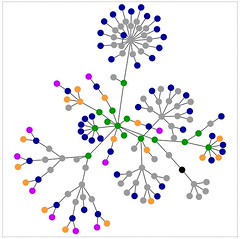This post consists of some notes and information to go along with a short chat I will be having with folk at the North Lanarkshire business meeting in Modern Languages at the invite of Robert Dalzell QIO International Education.
Disclaimer, a quick scan of this blog will prove that I’ve not mastered my first language never mind a second. I have no real knowledge of MFL except that I read quite a few MLF blogs and I have talked to MFL teachers before.
Not much of this post is specfic to MFL but hopefully the examples I give on the day will be of practical use to the audience.
Why Blogs?:
- Easy low bar technology:
If you can type you can blog. Recent blogging systems deal with text, and multi-media is a very simple and straightforward way. Low cost or free. Modern blogs handle media and organisation automatically in ways that used to be open only to skilled web developers. - Community & audience:
There is already a widespread network of educational blogging you can join. For pupils blogging can make learning real and purposeful. - Dissemination & Aggregation:
Through RSS (really simple syndication) it is easy to keep up with a large number of blogs and easy for your blog to be widely read.
Further reading on OpenSourceCPD:
Ways to use blogs in education::
- CPD
Blogging has become a powerful tool for professional development for many teachers and educators worldwide. By reading blogs you can keep up with some of the latest ideas in education and join in discussions of these ideas.
I’ve put together some ideas about this at OpenSourceCPD- Reading Blogs as CPD and there are some links to mfl teachers blogs below. - Teacher to Pupil:
Teachers can publish homework, revision, extra material. This can be text, files such as pdfs, audio (podcasting) or video. - Pupil Publishing:
(This is my favourite bit) A static website involves a fair bit of work and distances children from the publishing process. Weblogs allow children to become more directly involved in the publishing process without delving into time consuming html skills.
Allow children to ‘write the web’ as opposed to reading it.
It is another wall display
To give the children a wider (one of the widest) audience for some of their work, increase their sense of ownership and responsibility of their work and gain feedback and co-operation from others. Working in small groups on a shared text/media encourages peer feedback and co-operation.
Hopefully it should inform parents and even allow children to understand aspects of class life. Scanning down the blog show a surprisingly wide variety of activities recently covered.
For many children working on the computer still has motivational value and this is surely increased by the fact that we are publishing for the world.
Many types of media; images, comics, audio, video, animation can be used by pupils as well as text. Starting Blogging in the Classroom
Further Reading:
Blogs tagged MFL on ScotEduBlogs:
- The Gordon Schools
- Montrose Academy. Mr Curran (Modern Languages)
- Highland Modern Languages Subject Support
- edu.blogs.com
- Arion
- Woodhill Primary School French
- East Ayrshire Modern Languages News
- Firrhill French!
- Flappi mania
- GGS
- Inchinnan Primary School
LTS: MFLE – Information, support, ideas and resources for modern languages teaching

